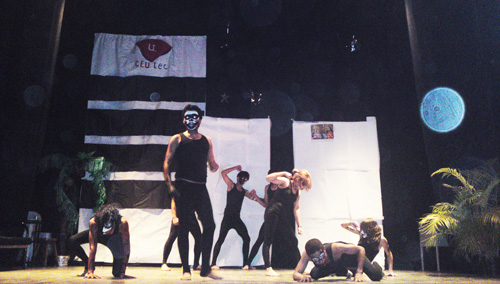Using street theater and peer outreach to educate Tegucigalpa’s youth about HIV and sexual diversity
Strategies:
1. Use street theater to educate young people about HIV, sexual diversity, and human rights
2. Conduct peer trainings and outreach to improve young people’s condom negotiation skills and to promote sexual health and sexual health services
3. Develop and conduct trainings for healthcare providers on the relationship between HIV transmission and sexual orientation
4. Distribute condoms and lubricant

AJEM members perform a theater piece that educates young people about sexual diversity. (Photo: AJEM)
The Asociación Jóvenes en Movimiento (AJEM) was founded in 2007 by a group of young activists taking part in the youth leadership program at GOJoven—an organization dedicated to improving the reproductive health of young people in Central America. Their mission for AJEM—improve the quality of life for LGBT youth and for youth from indigenous tribes, who are both often marginalized in Honduras, by educating them about holistic healthcare, their human rights, and the importance of citizen participation.
“From the beginning we had a mission to be a group led by young people working for young people, and our organization is now recognized as a youth effort and we have achieved many successes,” says Alex Sorto, president of AJEM. Today, all of AJEM’s staff and executive board remain under the age of 30.
HIV prevalence in Honduras is 0.7 percent, but among gay men and other men who have sex with men it is estimated to be 6.3 percent, making HIV outreach to young GMT a priority for AJEM. The rate is also higher in certain indigenous tribes, and most heavily impacts the Garifuna, one of the country’s largest tribes, who have an HIV rate of 4.5 percent.
“From the beginning we had a mission to be a
group led by young people working for young people.” AJEM aims to not only inform young people about HIV prevention and treatment, but also to empower them to prioritize their sexual health and fight for their human rights. “The issue of HIV/AIDS/STIs should be worked from a human rights perspective, because if it is only from the clinical side, it tends to confuse young people and that can downplay the issue,” says Sorto. A primary strategy of AJEM’s “Closing the Gaps, Integrating Communities” project—which is funded by amfAR and the Elton John AIDS Foundation—is achieving this through street theater pieces developed by a group of young LGBT artists.
The pieces address HIV prevention and human rights and provide examples of sexual diversity by dramatizing the issues around sex and sexual identity that LGBT youth—and all youth—face. The group has performed for hundreds as part of festivals and for thousands at University Autonoma. After each show, AJEM staff and volunteers meet with the young audience members in focus groups to get feedback on the performance and discuss the issues it raises. During these discussions, many young people have reported that the performance caused them to have a more positive attitude towards the different sexual orientations it depicted.
This human rights message is important in Honduras. In 2012, the country had the world’s highest murder rate and LGBT are especially at risk for experiencing violence because of the discrimination they continue to face in the country. In the last four years alone, over 80 LGBT people have been murdered, and in 2009 three members of AJEM were assaulted and beaten after rainbow flags were discovered in their van.
In addition to their performances, AJEM peer educators conduct outreach, often in informal outdoor venues where young people are more easily accessed and more comfortable. The outreach workers focus on improving condom negotiation skills among young GMT and often seek out young GMT sex workers, who are at particularly high risk of HIV infection. “Addressing the side issues such as self-esteem, sexual rights, and conflict resolution among youth facilitates the knowledge necessary for the prevention of HIV/AIDS/STIs,” says Sorto. The outreach workers also distribute condoms, lubricant, and educational leaflets in these venues and at universities.
Additionally, AJEM conducts workshops for GMT youth leaders to train them to do their own effective outreach and to teach them about stigma, discrimination, and national laws relating to HIV. Currently, as part of phase two of the amfAR-supported “Closing the Gaps, Integrating Communities” project, AJEM is conducting interviews with staff at healthcare facilities in Tegucigalpa. The interviews will inform a new outreach program AJEM is developing to educate healthcare providers about how to address the health needs of GMT youth.